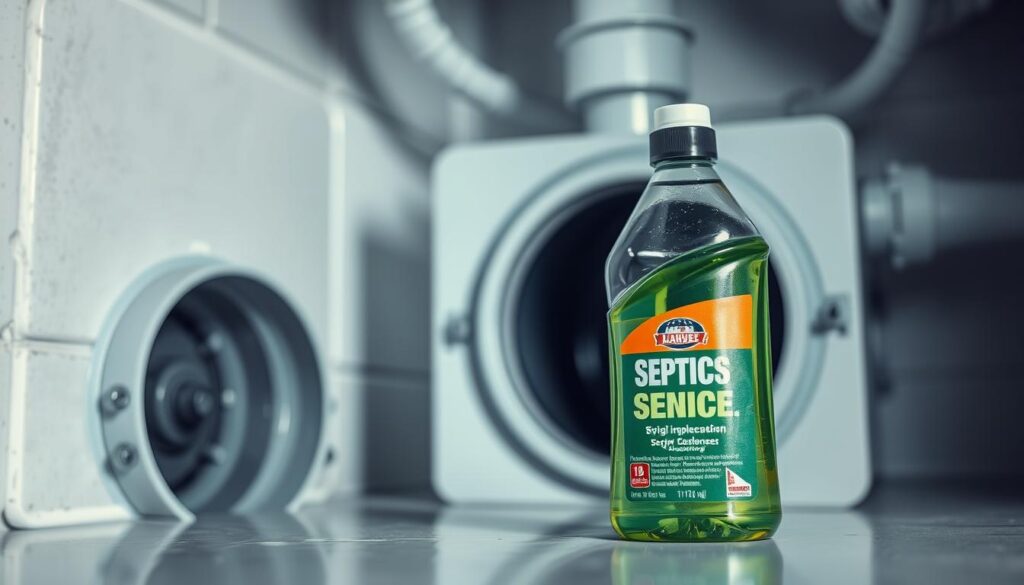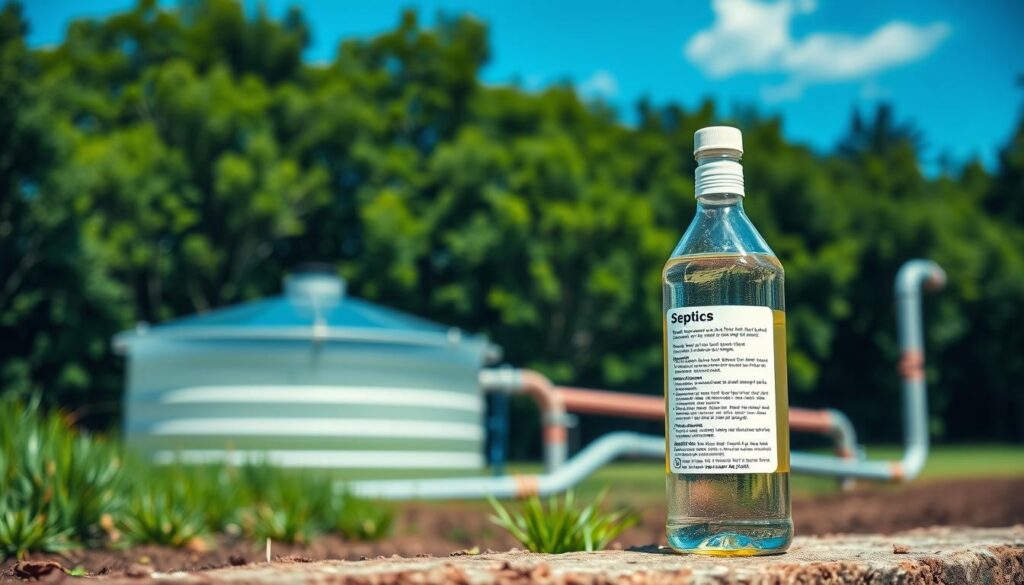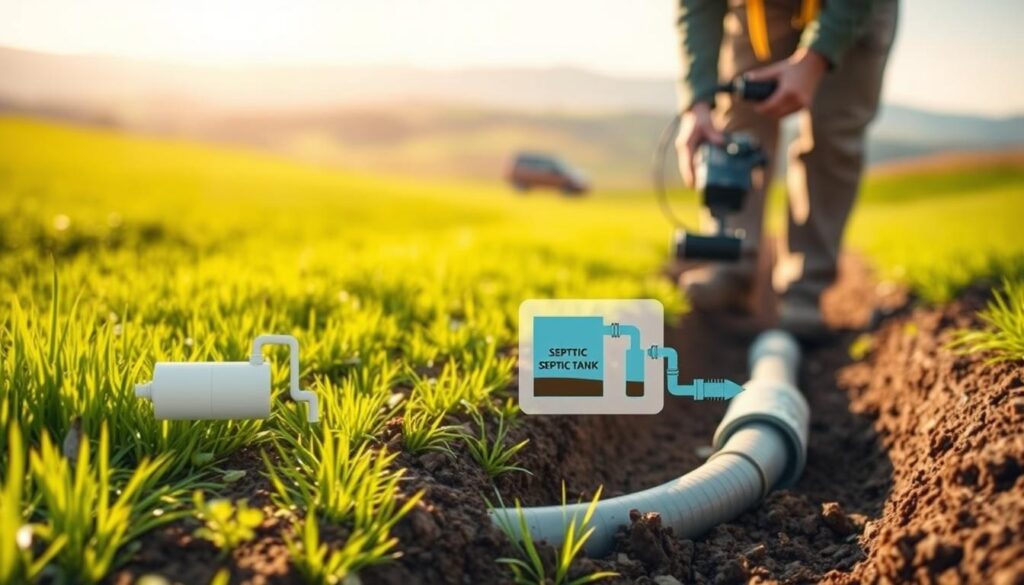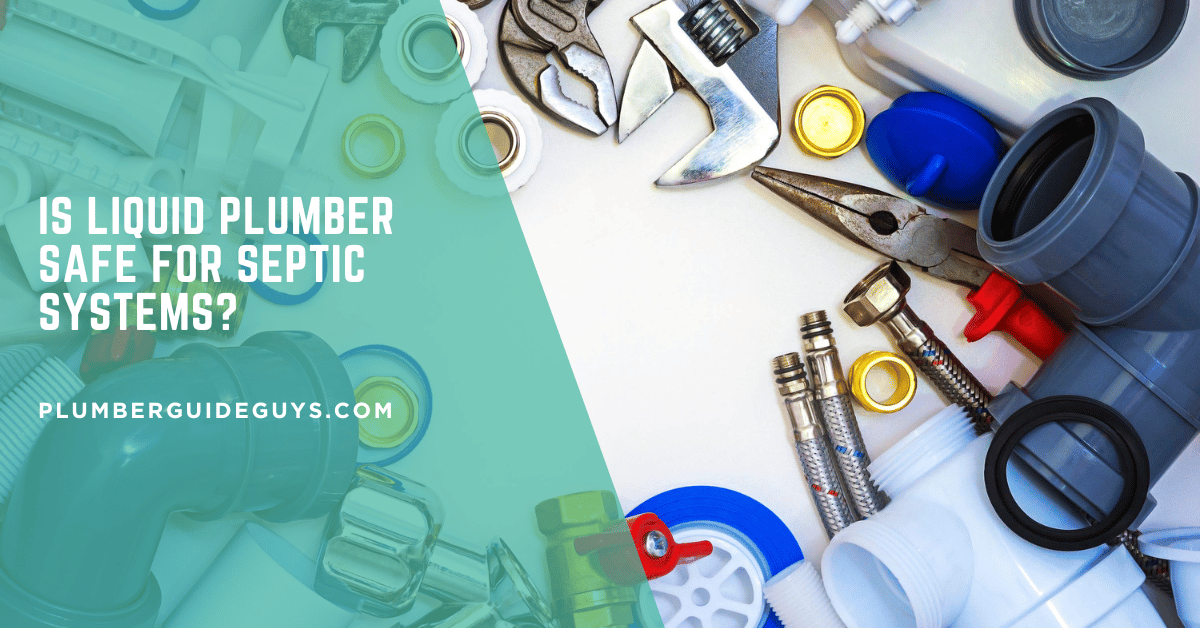Affiliate Disclosure
Plumber Guide Guys is a participant in the Amazon Services LLC Associates Program, an affiliate advertising program designed to provide a means for sites to earn advertising fees by advertising and linking to Amazon.
Is Liquid Plumber Safe for Septic Systems? Ever thought that Liquid Plumber might harm your septic system? With one in five homes in the US using septic systems, knowing if liquid drain cleaners are safe is key. It’s important for homeowners to understand this.

Chemical drain cleaners, like Liquid Plumber, might clear clogs fast. But they can also harm your septic system in ways you might not see. This article will explore if Liquid Plumber is safe for septic systems.
Many homeowners don’t realize the harm chemical solutions can cause to their septic tanks. The risks of using liquid drain cleaners on septic tanks are real. They can lead to expensive repairs if not handled right.
Key Takeaways
- Chemical drain cleaners can disrupt septic system bacteria
- One in five US homes uses a septic system
- Liquid Plumber may cause long-term septic damage
- Natural alternatives exist for drain maintenance
- Professional consultation is recommended for septic care
Table of Contents
Understanding Septic Systems and Their Function
A septic system is key for homes in rural and suburban areas. It’s a natural way to handle wastewater, unlike city sewers. It works underground to keep your home clean and the environment safe.
Septic systems have two main parts: a big tank and a drainage field. These tanks can hold about 1,000 gallons. They safely process and treat your home’s wastewater.
How Septic Tanks Process Waste
Knowing how septic systems work is important, even with drain cleaners. Here’s how it happens:
- Wastewater from your home goes into the septic tank.
- Solids settle at the bottom of the tank.
- Liquid waste moves to the drainage field.
- Bacteria break down organic materials.
The Role of Bacteria in Septic Systems
Bacteria are vital in septic systems. They break down waste and keep the system working. Without them, your septic system fails and harms the environment.
Differences Between Septic and Sewer Systems
Septic systems are different from city sewers. They need your care and maintenance. They give you freedom but require careful waste handling.
- Septic Systems: Treat waste on-site, need regular upkeep.
- Sewer Systems: Managed by cities, less upkeep needed.
The Importance of Bacterial Balance in Septic Tanks
Your septic tank is home to millions of tiny bacteria. They work hard to break down waste. These tiny heroes are key to keeping your septic system healthy.
It’s important to understand the balance of bacteria in your septic tank. These bacteria do several important jobs:
- Decompose solid waste materials
- Prevent system blockages
- Filter harmful contaminants
- Maintain overall system efficiency
Chemical drain cleaners can harm this balance. When you use harsh chemicals, you risk killing the good bacteria. It’s vital to protect these bacteria for your septic system’s health.
| Bacterial Type | Function | Importance |
|---|---|---|
| Anaerobic Bacteria | Break down organic matter | Primary waste decomposition |
| Aerobic Bacteria | Consume remaining waste | Complete waste treatment |
To keep your septic system healthy, think carefully about what you put into it. Frequent use of chemical drain cleaners can harm the delicate balance of bacteria. This could lead to expensive problems.
Is Liquid Plumber Safe for Septic Systems?
Homeowners often wonder if chemical drain cleaners like Liquid Plumber are safe for septic systems. It’s important to know what’s in the product and how it might affect your septic tank.
Chemical Composition Breakdown
Liquid Plumber has several key ingredients. These include:
- Sodium hydroxide (lye)
- Sodium hypochlorite (bleach)
- Aluminum fragments
Impact on Septic Bacteria
The question is, does Liquid Plumber work well with septic systems? The chemicals in it might upset the balance of good bacteria. But, Liquid Plumber is made to break down fast.
“Responsible use of chemical drain cleaners requires understanding their environmental impact.” – Septic System Experts
Ingredient Degradation Timeframe
When looking at Liquid Plumber’s safety for septic systems, how fast it breaks down is key. Most of its ingredients go away in 24-48 hours. This helps avoid lasting harm to septic systems.
| Ingredient | Degradation Time | Septic System Impact |
|---|---|---|
| Sodium Hydroxide | 24-36 hours | Moderate |
| Sodium Hypochlorite | 12-24 hours | Low |
| Aluminum Fragments | 48-72 hours | Minimal |
Even though Liquid Plumber is okay to use sometimes, it’s best to not use it too often. Try other ways to keep your septic system healthy for the long run.
Common Causes of Septic System Clogs
To keep your septic system working well, it’s important to know why clogs happen. Putting the wrong things down your drains can cause big problems. These issues can hurt your system’s performance and lead to expensive fixes.
Start your septic system care by knowing what not to flush. Some household habits can upset the balance of bacteria in your system.
- Grease and cooking oils
- Non-biodegradable items
- Chemical cleaning products
- Food scraps
- Personal hygiene products
Experts say to avoid these items to prevent clogs. Bacon grease, coffee grounds, and cooking oils are big no-nos. They can harden and block your system, making it work poorly.
| Clog Cause | Potential Damage | Prevention Strategy |
|---|---|---|
| Grease | Pipe blockages | Dispose in trash, not drain |
| Chemical Cleaners | Bacterial ecosystem disruption | Use septic-safe alternatives |
| Non-Biodegradable Items | System backup | Proper waste disposal |
Knowing these risks helps protect your septic system and saves money. Regular upkeep and careful disposal are essential for a well-functioning system.
Safe Alternatives to Chemical Drain Cleaners
Keeping your septic system safe doesn’t mean you’re out of options. You can use safe drain cleaning products for septic tanks that won’t harm good bacteria. Natural solutions are strong alternatives to harsh chemicals.
Natural Cleaning Solutions
You can make septic-friendly drain uncloggers in your kitchen. These green methods keep your pipes flowing without harming your septic system’s balance.
- Baking Soda and Vinegar Mixture
- Mix 1/2 cup baking soda with 1/2 cup white vinegar
- Pour down the drain
- Let sit for 30 minutes
- Flush with hot water
- Boiling Water Technique
- Slowly pour boiling water directly into drain
- Breaks down minor grease and soap buildup
- Safe for most pipe materials
DIY Drain Maintenance Methods
Stopping clogs before they start is easier than fixing them. Regular care keeps your septic system in top shape and cuts down on harsh cleaning needs.
| Maintenance Method | Frequency | Benefit |
|---|---|---|
| Hot Water Flush | Weekly | Prevents grease buildup |
| Enzyme-Based Cleaner | Monthly | Supports bacterial balance |
| Drain Strainer | Continuous | Stops solid debris |
Using these gentle, septic-safe methods helps protect your system and keeps drains working well. Always remember, it’s better to prevent problems than to fix them at a high cost.
Proper Usage Guidelines for Liquid Plumber in Septic Systems

Using liquid drain cleaner in septic systems needs careful thought. When you use Liquid Plumber in homes with septic systems, you must follow certain rules. These rules help keep your plumbing and the bacteria in your septic system healthy.
Before you use any liquid drain cleaner, think about the risks to your septic system. It’s important to compare Liquid Plumr to septic system health. Homeowners must make this comparison carefully.
- Use liquid drain cleaners sparingly
- Limit application to once every few months
- Avoid repeated use within short time frames
- Choose septic-safe formulations
Using liquid drain cleaners the right amount can help protect your septic system. Moderation is key when introducing chemical cleaners into your plumbing infrastructure.
| Usage Scenario | Recommended Action |
|---|---|
| Minor Drain Blockage | Small amount of septic-safe cleaner |
| Recurring Clogs | Professional inspection recommended |
| Severe Blockage | Mechanical snake or professional service |
Always read the labels on products carefully. Choose ones that are safe for septic systems. Don’t use liquid drain cleaners in dishwashers or with rubber pipes. These can harm your plumbing.
Protect your septic system by understanding its unique ecosystem and using chemical cleaners responsibly.
Signs of Septic System Damage from Chemical Cleaners
Chemical drain cleaners can harm your septic system in ways you might not see right away. It’s important to know the signs of damage to keep your home’s plumbing in good shape. This can help avoid expensive fixes later on.
Your septic system needs a special balance of bacteria. Chemical cleaners can upset this balance. Spotting damage early can help avoid costly repairs.
Critical Warning Indicators
- Persistent foul odors around drain areas or septic tank location
- Unusually slow drainage in sinks, showers, and toilets
- Gurgling sounds emerging from plumbing fixtures
- Wet or soggy ground near the drain field
- Sewage backup in toilets or drains
Professional Intervention Signals
The harm from chemical drain cleaners on septic systems is serious. Call a professional septic service right away if you see:
- Multiple drains experiencing simultaneous drainage issues
- Visible sewage pooling on your property
- Unexplained increases in water bill
- Recurring drainage problems despite DIY attempts
Septic experts can check the damage and suggest how to fix it. Acting fast can save your septic system and your property’s health.
Essential Septic System Maintenance Tips
Keeping your septic system in good shape is key. Using drain cleaners right can protect your home’s plumbing and save you money.
It’s important to regularly check and care for your septic system. Experts say to focus on keeping harmful chemicals out and ensuring your system works well for years.
- Inspect your septic system annually
- Schedule professional tank pumping every 3-5 years
- Minimize harsh chemical usage
- Monitor water consumption
- Protect the drain field area
Knowing what your system needs is part of good maintenance. Bacteria are the unsung heroes of your septic tank, breaking down waste and keeping things balanced.
“Your septic system is a living ecosystem that requires gentle, consistent care.” – Septic System Professionals Association
| Maintenance Task | Frequency | Purpose |
|---|---|---|
| Visual Inspection | Annually | Check for any problems |
| Professional Pumping | Every 3-5 years | Clear out built-up solids |
| Bacterial Treatment | As needed | Keep waste breakdown healthy |
By sticking to these tips, you can make your septic system last longer and avoid sudden problems. Good care keeps your property safe and helps the environment too.
Prevention Strategies for Drain Clogs
Keeping your septic system healthy starts with prevention. Drain clogs can damage your plumbing and septic system. This can lead to expensive repairs and even system failures. By using smart strategies, you can keep your drains clear and your septic system healthy.

Daily Habits for Drain Protection
Good daily habits are key to avoiding drain clogs. Here are some simple steps:
- Use mesh strainers in kitchen and bathroom sinks
- Run hot water after each sink use to prevent buildup
- Scrape dishes thoroughly before washing
- Dispose of food waste in compost or trash, not down drains
Substances to Avoid in Your Drains
Some materials can harm your septic system. It’s best to avoid these:
| Avoid Disposing | Potential Risks |
|---|---|
| Grease and cooking oils | Pipe blockages and bacterial disruption |
| Chemical cleaners | Destruction of beneficial septic bacteria |
| Coffee grounds | Solid waste accumulation |
| Non-biodegradable materials | Complete system failure |
By following these prevention tips, you’ll keep your septic system safe. This reduces the need for costly repairs and ensures it works well for years. Regular care and careful habits are your best defense against drain and septic problems.
Environmental Impact of Chemical Drain Cleaners
Chemical drain cleaners are harmful to the environment, not just your plumbing. Using liquid drain cleaner in a septic tank can lead to serious environmental problems.
These cleaners can destroy the balance in septic systems. They harm the bacteria needed to break down waste. This can cause lasting damage to the soil and environment.
- Groundwater contamination from harsh chemical ingredients
- Destruction of beneficial microorganisms in septic systems
- Potential soil pollution and ecosystem disruption
- Long-term environmental degradation
Using liquid drain cleaners in septic tanks is not just about keeping pipes clear. They can release toxic substances that:
- Kill important bacteria for waste breakdown
- Contaminate underground water
- Harm local wildlife and plants
- Lead to ongoing environmental issues
Homeowners should look for safer ways to clean drains. This protects their septic systems and the environment.
Protecting your septic system means protecting the environment around you.
Knowing how chemical drain cleaners affect the environment helps you make better choices. It’s about taking care of your home and the planet.
Professional Septic Services vs. DIY Solutions
Keeping your septic system in good shape is a big decision. You might be able to fix small problems yourself. But, serious issues need a pro.
Choosing between hiring a pro or doing it yourself depends on the problem. Experts have the right tools and know-how that homeowners don’t.
“Not all septic problems are created equal – knowing when to call a professional can save you thousands in potentially costly repairs.”
- Professional septic services offer complete diagnostic tools
- Experts know the safest products for septic tanks
- They have special equipment for tough drainage issues
- Professionals give long-term maintenance plans
Your septic system needs careful upkeep. DIY fixes are okay for simple clogs. But, for complex problems, you need a pro.
Trained technicians can spot issues early. This saves you from expensive fixes later on.
| DIY Solutions | Professional Services |
|---|---|
| Basic drain cleaning | Advanced diagnostic scanning |
| Minor clog removal | Comprehensive system evaluation |
| Simple maintenance | Specialized repair techniques |
Always put your septic system’s health first. Know when to call a pro. Getting expert help can avoid big problems and save you money in the long run.
Conclusion
Figuring out if Liquid Plumber is safe for septic systems needs careful thought. Your septic system’s health relies on a balance of bacteria. Chemical drain cleaners can upset this balance.
When dealing with clogs, choose septic-friendly uncloggers. They help keep the good bacteria in your system.
Preventative care is key to a healthy septic system. Regular checks, careful water use, and avoiding harsh chemicals help a lot. If you’re not sure about Liquid Plumber’s safety, talk to a septic expert.
They can give advice that fits your system’s needs.
Your septic system is a big deal for your home and the environment. Using gentle cleaners and regular maintenance keeps it working well. This saves you money and trouble in the long run.
Every choice you make affects your system’s health and your property. It’s not just about fixing problems now. It’s about a long-term plan for waste management that’s good for your home and the planet.
Make smart choices and stay alert. Your septic system will be reliable for many years.

